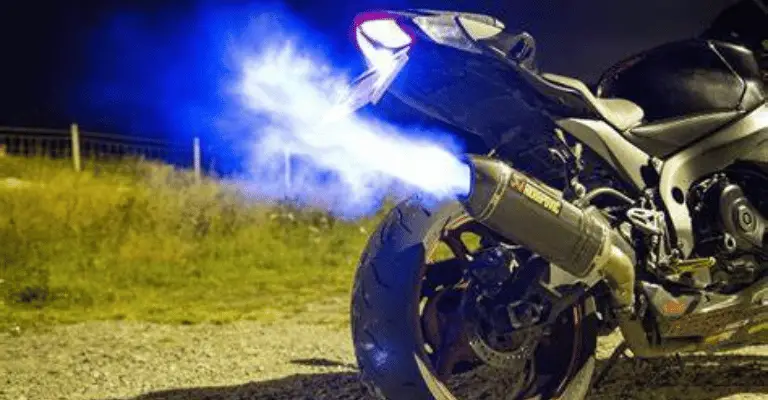Motorcycle enthusiasts often encounter a common issue – their beloved two-wheeler making a ‘popping’ sound during deceleration. But what exactly causes this? Should you be worried? This comprehensive guide will provide answers to your questions and more. So what’re you waiting for? Let’s get to it!
What Causes A Motorcycle To Pop on Deceleration?
The decel pop, technically known as ‘deceleration popping’, occurs when unburned fuel escapes the combustion chamber and detonates in the exhaust pipe, particularly in high-flow exhausts that allow more fresh air to be pulled into the pipe. This can happen due to a rich or lean air-fuel mixture, fuel injection issues, or various mechanical factors.

1. Rich Air Fuel Mixture
What’s A Rich Condition?
A rich condition arises when there’s too much fuel and not enough air in the combustion mixture. This results in unburnt fuel that makes its way into the exhaust system, causing the popping sound. This can also lead to stalling over time, or in some extreme cases, smoke will come from the exhaust.
Read next:
> How To Check The Oil On A Motorcycle
> How Often Should You Change Your Oil On A Motorcycle?
What Causes A Rich Condition?
The primary cause of a rich condition is a faulty fuel injector system, particularly in electronic fuel injection models. If the system injects too much fuel into the engine, it leads to a rich condition. This is commonly seen in older Harley-Davidson models with Magnetti-Marelli fuel injection systems.
For carbureted models, improper jetting (pilot, main, and needle) can lead to a rich condition. If the jets are too large, they can deliver an excess amount of fuel, causing the mixture to become rich. It’s important to note that even rich conditions can cause the motorcycle to stall.
Related: Annoying Symptoms of Overheating Motorcycle Demystified
2. Fuel Injection Issues (Typically Electronic)
Electronic fuel injection systems can sometimes malfunction, causing them to inject more fuel than necessary. This can be due to a variety of reasons, such as faulty sensors, software glitches, carbon build up on the ehxuast port, or issues with the throttle body. For example, in newer Harley-Davidson models with Delphi fuel injection systems, adding fuel is often required to reduce popping.
Related: Why Is My Motorcycle Losing Power When Accelerating?
3. For Carbureted Models:
Improper Jetting (Check Pilot, Main, and Needle)
In carbureted models, improper jetting is a common issue. If the pilot jet, main jet, or needle jet is incorrectly sized, it could lead to a rich condition. Adjusting these jets to the correct size can help reduce the popping sound.
Related: Motorcycle Wont Idle? Know This
Lack of Sufficient Air Flow
Insufficient airflow can also cause a rich condition. If the air filter is dirty or clogged, it can restrict the amount of air entering the engine, leading to a rich mixture. Regularly cleaning or replacing the air filter can help alleviate this problem. This can usually be identified by a spitting, coughing, or a sputter when accelerating.
4. Lean Air Fuel Mixture
What’s A Lean Condition?
A lean condition is the opposite of a rich condition. It occurs when there’s too much air and not enough fuel in the combustion mixture. This can cause the fuel to burn too quickly, resulting in a popping sound during deceleration.
Read next: Motorcycle Goes Into Gear But Wont Move? Do This
What Can Lead To A Lean Condition?
Several factors can lead to a lean condition:
- Damaged or Degraded Rubber: Rubber components such as intake manifold boots and vacuum lines can degrade over time, leading to air leaks. This can result in a lean condition.
- Intake Manifold Boots: If the intake manifold boots are cracked or loose, they can allow excess air to enter the engine, causing a lean mixture.
- Worn Vacuum Lines: Vacuum lines can also wear out over time, leading to air leaks. Regularly checking and replacing these lines can prevent a lean condition.
- Damaged Exhaust Gaskets: If the exhaust gaskets are damaged, they can allow fresh air to be pulled into the exhaust Port during deceleration, causing the popping sound. These are also commonly known as exhaust leaks
- Fouled or Worn Spark Plugs: Spark plugs that are fouled or worn can prevent the fuel from burning properly, leading to a lean condition.
So, Should I Worry About The Popping?
While the popping sound can be alarming, it’s usually not a cause for concern unless it’s excessively loud or accompanied by other symptoms such as loss of power or poor performance. It’s always a good idea to consult a mechanic if you’re unsure.
Related: Can Bad Gas Cause Misfires?
Recap of What You Need To Know
Deceleration popping is a common occurrence in motorcycles and is typically caused by a rich or lean air-fuel mixture in the combustion chamber, or or fuel injection issues otherwise. While it’s usually not a cause for concern, it’s important to regularly maintain your motorcycle and consult a mechanic if the popping sound becomes excessively loud or if you notice any other issues.
Remember: Always prioritize safety and consult with a professional mechanic if you’re unsure about any issues or modifications related to your motorcycle.
Read next: Avoid This Deathly Motorcycle Death Wobble
FAQs
This section can include frequently asked questions about deceleration popping and provide concise, insightful answers to them.